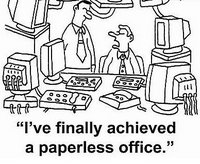The Paperless Appraisal Office - A Small Firm's Approach - Less Paper vs Paper-Less
 Your appraisal firm is buried in paper. That's no surprise. That’s one of most common complaints among appraisers and their staff.
From 6 tips for a "paperless" office By Joseph Anthony - "Paperless often really means less paper.”
To paraphrase Mr. Anthony . . It's possible to scan your field notes, MLS sheets, and other paper into your computer, and to store all in-house documents in your system as well. You can even eliminate paper faxes, electronically sign documents, deliver PDF reports, and collect your field data on a PDA or tablet PC. "But you're still likely to have some paper floating through your office.”
For the time being, I’ve learned to relax and accept that for a small office, it may be best to combine some use of paper alongside electronic or digital information systems. This approach can substantially reduce, although certainly not eradicate, the reliance on paper in your office.
Some of the most effective paper-busting technologies that I’ll be discussing in this series include:
• Computers: PCs, laptops, Tablets, and handhelds can be combined for document creation mobility and flexibility, stamping out rampant paper use.
• Scanners: Scanners create digital images so that documents can be exchanged electronically and preserved easily. Make sure to choose a single, standardized electronic document format so that images can be indexed and searched easily. Most appraisers have adopted the universally accepted PDF (Portable Document Format) as their standard for delivering reports.
• E-mail: E-mail is a great substitute for paper memos. Effective e-mail systems should allow users to filter content and file messages electronically by topic. They also should let workers combine e-mail with fax and voice-mail retrieval in a unified messaging system.
• Storage systems: Affordable, robust storage technology is essential for high-speed, centralized electronic information management and for data backup. Check out low-cost systems built upon RAID (Redundant Array of Independent Disks) technology combined with off-site Internet storage solutions for appraisers like the Vault by a la mode..
• Fax over IP (Internet protocol): The boring old fax goes high-tech with a Web- or e-mail-based fax capability that eliminates the need to send hard copies.
• Wireless local area networks: Wi-Fi LANs are spreading like wildfire, making electronic information mobile, portable and easily accessible to appraisers anywhere.
• Secure remote access: Virtual private networks (VPNs) of products like GoToMyPC and LogMeIn ensure that “road warriors” get secure access to the office computer, abolishing the need to lug around a boxes full of workfiles, MLS books, or maps.
• E-learning systems: Appraisers in training can say good-bye to books and binders when they use online or Web-based training and resource systems. Place shortcuts on your computer “desktop” with links to USPAP, Fannie Mae, and VA guidelines.
• Advanced printers: Consider a multi-function printer-scanner with a sheet-feeder. In my small office I opted to add a low-end printer-scanner by Brother. It replaces a fax machine, a copier, a scanner, and even includes a built-in Ethernet port and media card readers. My choice can be purchased for under $100 (when rebates are on) at Staples or online.
Naturally, each appraisal office’s needs vary. So companies are advised to take the following steps:
Your appraisal firm is buried in paper. That's no surprise. That’s one of most common complaints among appraisers and their staff.
From 6 tips for a "paperless" office By Joseph Anthony - "Paperless often really means less paper.”
To paraphrase Mr. Anthony . . It's possible to scan your field notes, MLS sheets, and other paper into your computer, and to store all in-house documents in your system as well. You can even eliminate paper faxes, electronically sign documents, deliver PDF reports, and collect your field data on a PDA or tablet PC. "But you're still likely to have some paper floating through your office.”
For the time being, I’ve learned to relax and accept that for a small office, it may be best to combine some use of paper alongside electronic or digital information systems. This approach can substantially reduce, although certainly not eradicate, the reliance on paper in your office.
Some of the most effective paper-busting technologies that I’ll be discussing in this series include:
• Computers: PCs, laptops, Tablets, and handhelds can be combined for document creation mobility and flexibility, stamping out rampant paper use.
• Scanners: Scanners create digital images so that documents can be exchanged electronically and preserved easily. Make sure to choose a single, standardized electronic document format so that images can be indexed and searched easily. Most appraisers have adopted the universally accepted PDF (Portable Document Format) as their standard for delivering reports.
• E-mail: E-mail is a great substitute for paper memos. Effective e-mail systems should allow users to filter content and file messages electronically by topic. They also should let workers combine e-mail with fax and voice-mail retrieval in a unified messaging system.
• Storage systems: Affordable, robust storage technology is essential for high-speed, centralized electronic information management and for data backup. Check out low-cost systems built upon RAID (Redundant Array of Independent Disks) technology combined with off-site Internet storage solutions for appraisers like the Vault by a la mode..
• Fax over IP (Internet protocol): The boring old fax goes high-tech with a Web- or e-mail-based fax capability that eliminates the need to send hard copies.
• Wireless local area networks: Wi-Fi LANs are spreading like wildfire, making electronic information mobile, portable and easily accessible to appraisers anywhere.
• Secure remote access: Virtual private networks (VPNs) of products like GoToMyPC and LogMeIn ensure that “road warriors” get secure access to the office computer, abolishing the need to lug around a boxes full of workfiles, MLS books, or maps.
• E-learning systems: Appraisers in training can say good-bye to books and binders when they use online or Web-based training and resource systems. Place shortcuts on your computer “desktop” with links to USPAP, Fannie Mae, and VA guidelines.
• Advanced printers: Consider a multi-function printer-scanner with a sheet-feeder. In my small office I opted to add a low-end printer-scanner by Brother. It replaces a fax machine, a copier, a scanner, and even includes a built-in Ethernet port and media card readers. My choice can be purchased for under $100 (when rebates are on) at Staples or online.
Naturally, each appraisal office’s needs vary. So companies are advised to take the following steps:
- Assess current paper usage,
- determine which electronic systems are most useful,
- get familiar with and read reviews of available products,
- and get the best price.
So be heartened. There are numerous ways to substantially slash the use of paper, while striving for the ultimate goal of a completely paperless office. I'd love to hear YOUR comments and suggestions!
For more articles on this topic: Paperless Office - Ten Steps To Getting Started Paperless Office - Dual Monitors
0 Comments:
Post a Comment
<< Home